|
|
|
Sort Order |
|
|
|
Items / Page
|
|
|
|
|
|
|
| Srl | Item |
| 1 |
ID:
130908
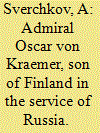

|
|
|
|
|
| Publication |
2014.
|
| Summary/Abstract |
MY ACQUAINTANCE with Oscar von Kraemer began in Denmark, at the museum of the town of Lemvig, in the section dedicated to the shipwreck of the Imperial Russian frigate Alexander Nevsky. I learned about the life of this all-around interesting man when I came across a book published by Finnish historians Bernhard Estlander and Karl Ekman in Helsinki in 1931, entitled "Fran hav och hov" (in the translation from Swedish - "At sea and court"). It is based on the rich
epistolary legacy of von Kraemer, who, in addition, possessed an extraordinary literary gift. This book not only gives an excellent portrayal of this undoubtedly talented man, but is an interesting evidence of an entire era in the history of Russia and its Navy. The name of Kraemer says little to the present generation of Russians and Finns. I do not think that his biography is well known to naval historians of these two countries either. The admiral's personal belongings and papers are kept in the National Archives of Finland and by his descendants living in this country.
|
|
|
|
|
|
|
|
|
|
|
|
|
|
|
|
| 2 |
ID:
138478


|
|
|
| 3 |
ID:
130843
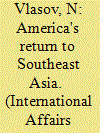

|
|
|
|
|
| Publication |
2014.
|
| Summary/Abstract |
The article examines U.S. foreign relations with Southeast Asia. An increase in U.S. involvement in the region under the administration of President Barack Obama is considered. A contradiction in U.S. policy is said to exist between insistence by the administration that its desire for stability and freedom of the seas in Southeast Asia is not intended as containment of China and China's aggressive maritime boundary claims in the South China Sea.
|
|
|
|
|
|
|
|
|
|
|
|
|
|
|
|
| 4 |
ID:
130897
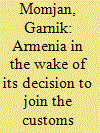

|
|
|
|
|
| Publication |
2014.
|
| Summary/Abstract |
I will speak about the situation in Armenia. On September 3, 2013 at the meeting with President Putin in Moscow, our President Serzh Sargsyan announced that Armenia would join the custom union. This statement echoed all over the world : in the evening, all leading information agencies and the media - BBC, Euronews and the Wall Street Journal were discussing it; they concluded that Russia had put pressure on Armenia.
|
|
|
|
|
|
|
|
|
|
|
|
|
|
|
|
| 5 |
ID:
130834
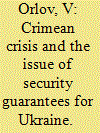

|
|
|
|
|
| Publication |
2014.
|
| Summary/Abstract |
The author offers opinions on the Budapest Memorandum, a 1994 agreement between Russia, Ukraine, Great Britain and the U.S. offering security guarantees for Ukraine in return for its nuclear disarmament. Citing the history of Ukraine's foreign relations since 1991, It is stated that since the U.S. and Great Britain have recognized the provision government created in 2014 while Russia has not, the Memorandum has no relevance to Russia's intervention in Crimea.
|
|
|
|
|
|
|
|
|
|
|
|
|
|
|
|
| 6 |
ID:
130838
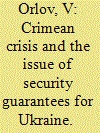

|
|
|
|
|
| Publication |
2014.
|
| Summary/Abstract |
The author offers opinions on the Budapest Memorandum, a 1994 agreement between Russia, Ukraine, Great Britain and the U.S. offering security guarantees for Ukraine in return for its nuclear disarmament. Citing the history of Ukraine's foreign relations since 1991, It is stated that since the U.S. and Great Britain have recognized the provision government created in 2014 while Russia has not, the Memorandum has no relevance to Russia's intervention in Crimea.
|
|
|
|
|
|
|
|
|
|
|
|
|
|
|
|
| 7 |
ID:
130891
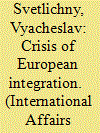

|
|
|
|
|
| Publication |
2014.
|
| Summary/Abstract |
Conferences organized by the journal in Yalta have already become a good tradition. It will be needless to speak of the significance that the Crimean land has for us: historically, ethnically, and mentally. Crimea is always a special place for Russia. There is no other area outside of Russia where so many Russian people live - Russian not only by ethnic origin, not only by blood, but also by spirit and mentality. We often
hear that Ukraine is going its own way, in accordance with its national interests. Of course, the choice of way is the right of every sovereign state. But many keep wondering about this. For example, at a recent meeting with local political analysts, the Chairman of the Council of Ministers of the Autonomous Republic of Crimea, Anatoly Mogilev, put the following question to the audience: "Will the signing of
the document in Vilnius become an irritating factor for Crimean society and lead to a destabilization of the situation?" The question is how to avoid de stabilization because nobody, whether in Moscow or in Kiev or especially in Crimea, is interested in it. No prediction of public behavior in this situation is yet available and we are looking forward to recommendations from the expert community.
|
|
|
|
|
|
|
|
|
|
|
|
|
|
|
|
| 8 |
ID:
130892
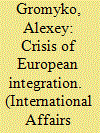

|
|
|
|
|
| Publication |
2014.
|
| Summary/Abstract |
Today, multipolarity and polycentrism are quantitatively and qualitatively different from their "prototypes" of historical periods of the past. Here it is necessary to single out three moments. First, Euro-centrism has been fading away in the past 20 years. Up to the 20th century, all the "concerts of powers" were based on the leading role of European states in international relations. Secondly, this new polycentrism is moving away from the straightforward dominance of the principle of force. The third moment, which characterizes the new-style multipolarity, is a phenomenon of international law that we have inherited from the 20th century.
|
|
|
|
|
|
|
|
|
|
|
|
|
|
|
|
| 9 |
ID:
130893
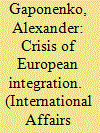

|
|
|
|
|
| Publication |
2014.
|
| Summary/Abstract |
AFTER THE USSR'S COLLAPSE, the Baltic states came under the political influence of the US and the economic influence of the European Union. This influence was used by their new geopolitical "curators" to initiate an anti-Russian line in both the foreign and domestic policies of Latvia, Lithuania and Estonia, as well as to break their economic ties with Russia. At present, the only significant economic ties that Russia still has with the Baltic countries are in the energy sector. It's the supply of natural gas through the pipeline and distribution systems with the use of the Incukalns underground storage facility. It's also the supply of Russian electricity and rail deliveries of hydrocarbons via the Ventspils and Klaipeda ports.
|
|
|
|
|
|
|
|
|
|
|
|
|
|
|
|
| 10 |
ID:
130903
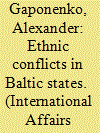

|
|
|
|
|
| Publication |
2014.
|
| Summary/Abstract |
To my mind, the European Union - EU was planned as strictly an economic union and its founder did not plan right from the start to form a single European community of nations or even a European civilization of a higher level.
|
|
|
|
|
|
|
|
|
|
|
|
|
|
|
|
| 11 |
ID:
130904
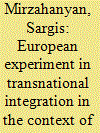

|
|
|
|
|
| Publication |
2014.
|
| Summary/Abstract |
The theme is one for political science rather than cultural studies. To talk about supranationality and not to talk about identity is impossible, because these concepts are interrelated. Supranationality is a terms that has recently comes into vogue in the mainstream domestic socio-political discourse. This is due primarily to the perspective of the creation in the post Soviet space of a new integration construct the European Union.
|
|
|
|
|
|
|
|
|
|
|
|
|
|
|
|
| 12 |
ID:
130898
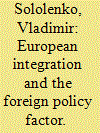

|
|
|
|
|
| Publication |
2014.
|
| Summary/Abstract |
"European integration has progressively moved forward through crisis." "Europe always emerges stronger after a crisis." "Without previous crises, the European Union would not have reached the advanced stage it is at today." Across EU history we have heard such slogans from European heads of state or government, EU officials, and scholars too. They tend to sing the 'Europe moves forward through crisis' refrain almost in tune whenever the next EU challenge comes along. The chorus has swelled to new volumes with the onset of the European sovereign debt crisis.
|
|
|
|
|
|
|
|
|
|
|
|
|
|
|
|
| 13 |
ID:
130899
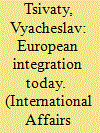

|
|
|
|
|
| Publication |
2014.
|
| Summary/Abstract |
It so happens that we are witnesses to the great geopolitical changes, where one political and economic system is replacing another, where the boundaries of political regions and alliances are shifting, and where the system of international relations is institutionalizing, integrating and transforming. A key characteristic that defines the development vectors of countries in the post- Soviet space is the search by newly independent states for an attractive integration nucleus. On the whole, from all indications, the process of the formation of a more or less stable system of foreign political ties between the post-Soviet states is complete. This accounts for the prevalence of the selective integration vector, namely, the fact that collaboration along the lines of the Customs Union and the EU has taken center stage.
|
|
|
|
|
|
|
|
|
|
|
|
|
|
|
|
| 14 |
ID:
130840
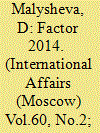

|
|
|
|
|
| Publication |
2014.
|
| Summary/Abstract |
The article examines the impact of the withdrawal of most U.S. and International Security Assistance Force (ISAF) armed forces from Afghanistan in 2014 on foreign relations in Central Asia. The possibility that the withdrawl will lead to a return to power of the Taliban movement and impact of that outcome on internal security in Tajikistan, Uzbekistan and Turkmenistan are examined. Russia's foreign relations with Central Asia are discussed in relationship to possible instability in Afghanistan.
|
|
|
|
|
|
|
|
|
|
|
|
|
|
|
|
| 15 |
ID:
130894
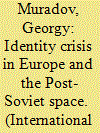

|
|
|
|
|
| Publication |
2014.
|
| Summary/Abstract |
ONLY YEARS LATER does it become evident to politicians and scholars at home and abroad that the fragmentation of historical Russia and the concomitant threat of disintegration facing one of the world's backbone civilization alliances that have been around for several centuries in Eastern Europe and Northern Asia was not a local development of the 90s of the last century, not the collapse of a state that was shortlived by historical standards and known as the Soviet Union, but only the beginning of an extremely dangerous tectonic process of the remaking of the world order.
|
|
|
|
|
|
|
|
|
|
|
|
|
|
|
|
| 16 |
ID:
130850
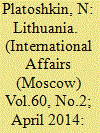

|
|
|
|
|
| Publication |
2014.
|
| Summary/Abstract |
In November 2013, Ukraine and several other former Soviet Republics declined and association with the European Union at the Vilnius Summit of Eastern Partnership.
|
|
|
|
|
|
|
|
|
|
|
|
|
|
|
|
| 17 |
ID:
130847
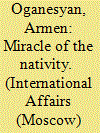

|
|
|
|
|
| Publication |
2014.
|
| Summary/Abstract |
The author offers opinions on Christianity. The birth of Jesus Christ is said to have occurred at a period when regard for human life was almost nil. Agreement is expressed with early 20th century Orthodox theologian St. Justin Popovic's contention that Christianity's singular feature was its call for believers to remain faithful and without sin in a world where evil is always present.
|
|
|
|
|
|
|
|
|
|
|
|
|
|
|
|
| 18 |
ID:
130895
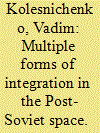

|
|
|
|
|
| Publication |
2014.
|
| Summary/Abstract |
THE QUESTIONS of European integration and the development of the European Union intersect. Currently, the Eurasian thrust is being developed vigorously. Ukraine, like other post-Soviet countries, is one of the objects of these big politics of influence. Russia's trouble is that it took long to act. The situation we see in Ukraine is the result of the fact that for many years Ukraine was unattractive for Russia. Russia was itself very weak and did not have the appropriate resources and capabilities. It itself needed to hold on. During this time, Ukraine was flooded by European and American foundations and entities with multi-million dollar grants. A pro-European and a pro-American lobby have been formed, and their choice is already predetermined.
|
|
|
|
|
|
|
|
|
|
|
|
|
|
|
|
| 19 |
ID:
130854
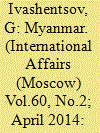

|
|
|
|
|
| Publication |
2014.
|
| Summary/Abstract |
If Asia's experience is any guide, economic success is archived only by nations with strong governments, even if they curtail some rights.
Myanmar, formerly Burma, has been increasingly in the focus of international mass media in recent years. The sudden visit paid there in 2011 by Hillary Clinton, was followed in 2012 by that of Barak Obama.
|
|
|
|
|
|
|
|
|
|
|
|
|
|
|
|
| 20 |
ID:
130905


|
|
|
|
|
| Publication |
2014.
|
| Summary/Abstract |
THE INTEGRATION PROCESSES, which have passed to the stage of concrete implementation in the Customs Union format, are now, in a sense, an indicator of stability for the member countries' national and state identity. A policy of ethnic tolerance and social solidarity ensures domestic stability. Kazakhstan's citizens are members of more than 100 ethnic groups and 17 religious confessions. Building a political nation has become the basis for shaping national andstate identity in Kazakhstan. A strong economy, ethnic and religious harmony, and patriotism are to be a response to the challenges of modernity.
|
|
|
|
|
|
|
|
|
|
|
|
|
|
|
|
|
|
|
|
|